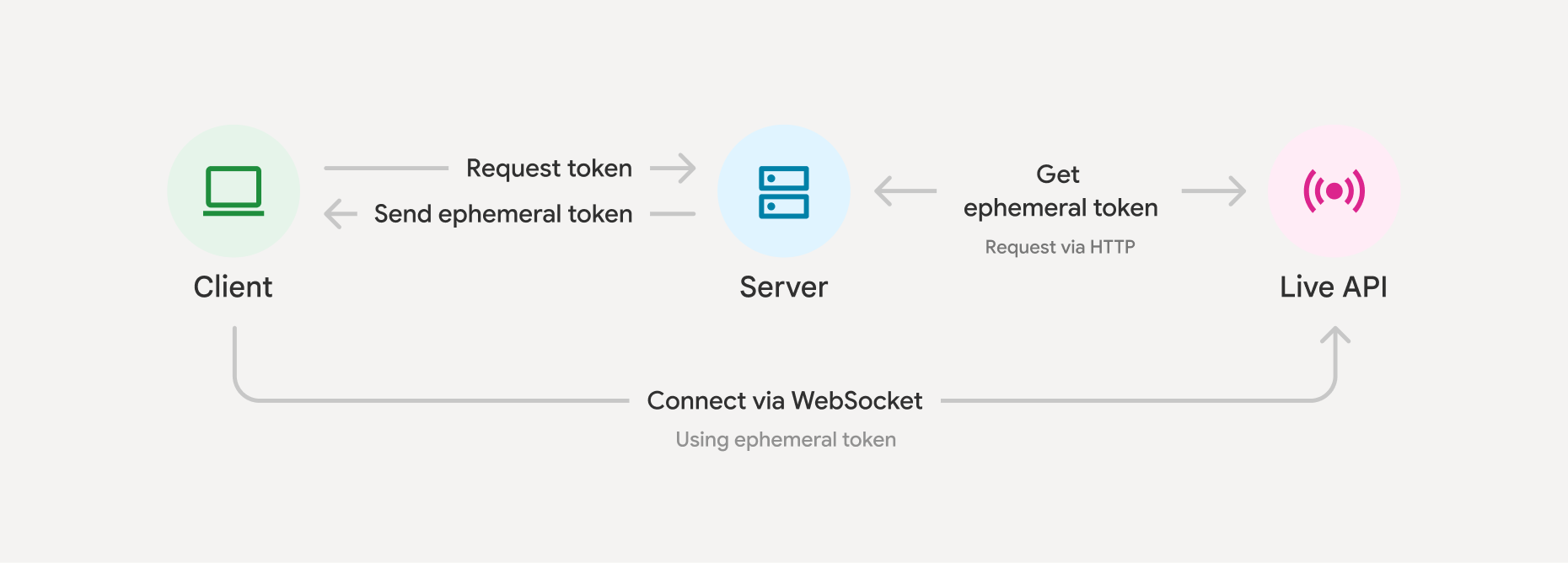Tokeny tymczasowe to krótkotrwałe tokeny uwierzytelniające, które umożliwiają dostęp do interfejsu Gemini API za pomocą WebSockets. Zostały one zaprojektowane w celu zwiększenia bezpieczeństwa podczas łączenia się bezpośrednio z interfejsem API z urządzenia użytkownika (implementacja klient-serwer). Podobnie jak standardowe klucze interfejsu API, tymczasowe tokeny można wyodrębnić z aplikacji po stronie klienta, takich jak przeglądarki internetowe lub aplikacje mobilne. Jednak tymczasowe tokeny szybko wygasają i można je ograniczać, co znacznie zmniejsza ryzyko związane z bezpieczeństwem w środowisku produkcyjnym. Używaj ich, gdy uzyskujesz dostęp do interfejsu Live API bezpośrednio z aplikacji po stronie klienta, aby zwiększyć bezpieczeństwo klucza interfejsu API.
Jak działają tymczasowe tokeny
Oto jak działają tokeny tymczasowe:
- Klient (np. aplikacja internetowa) uwierzytelnia się w backendzie.
- Backend wysyła żądanie tokena tymczasowego do usługi udostępniania interfejsu Gemini API.
- Interfejs Gemini API wydaje krótkotrwały token.
- Backend wysyła token do klienta w przypadku połączeń WebSocket z Live API. Możesz to zrobić, zastępując klucz interfejsu API tokenem tymczasowym.
- Klient używa tokena tak, jakby był kluczem interfejsu API.

Zwiększa to bezpieczeństwo, ponieważ nawet jeśli token zostanie wyodrębniony, będzie miał krótki okres ważności, w przeciwieństwie do klucza interfejsu API o długim okresie ważności wdrożonego po stronie klienta. Ponieważ klient wysyła dane bezpośrednio do Gemini, poprawia to też opóźnienia i eliminuje konieczność przekazywania danych w czasie rzeczywistym przez backendy.
Tworzenie tokena efemerycznego
Oto uproszczony przykład uzyskiwania tymczasowego tokena od Gemini.
Domyślnie masz 1 minutę na rozpoczęcie nowych sesji Live API przy użyciu tokena z tego żądania (newSessionExpireTime) i 30 minut na wysyłanie wiadomości przez to połączenie (expireTime).
Python
import datetime
now = datetime.datetime.now(tz=datetime.timezone.utc)
client = genai.Client(
http_options={'api_version': 'v1alpha',}
)
token = client.auth_tokens.create(
config = {
'uses': 1, # The ephemeral token can only be used to start a single session
'expire_time': now + datetime.timedelta(minutes=30), # Default is 30 minutes in the future
# 'expire_time': '2025-05-17T00:00:00Z', # Accepts isoformat.
'new_session_expire_time': now + datetime.timedelta(minutes=1), # Default 1 minute in the future
'http_options': {'api_version': 'v1alpha'},
}
)
# You'll need to pass the value under token.name back to your client to use it
JavaScript
import { GoogleGenAI } from "@google/genai";
const client = new GoogleGenAI({});
const expireTime = new Date(Date.now() + 30 * 60 * 1000).toISOString();
const token: AuthToken = await client.authTokens.create({
config: {
uses: 1, // The default
expireTime: expireTime // Default is 30 mins
newSessionExpireTime: new Date(Date.now() + (1 * 60 * 1000)), // Default 1 minute in the future
httpOptions: {apiVersion: 'v1alpha'},
},
});
Ograniczenia wartości, wartości domyślne i inne specyfikacje pól expireTime znajdziesz w dokumentacji interfejsu API.
W expireTime tym czasie musiszsessionResumption co 10 minut ponownie nawiązywać połączenie (możesz to zrobić za pomocą tego samego tokena, nawet jeśli uses: 1).
Możesz też powiązać token efemeryczny z zestawem konfiguracji. Może to być przydatne do dalszego zwiększania bezpieczeństwa aplikacji i przechowywania instrukcji systemowych po stronie serwera.
Python
client = genai.Client(
http_options={'api_version': 'v1alpha',}
)
token = client.auth_tokens.create(
config = {
'uses': 1,
'live_connect_constraints': {
'model': 'gemini-2.5-flash-native-audio-preview-12-2025',
'config': {
'session_resumption':{},
'temperature':0.7,
'response_modalities':['AUDIO']
}
},
'http_options': {'api_version': 'v1alpha'},
}
)
# You'll need to pass the value under token.name back to your client to use it
JavaScript
import { GoogleGenAI } from "@google/genai";
const client = new GoogleGenAI({});
const expireTime = new Date(Date.now() + 30 * 60 * 1000).toISOString();
const token = await client.authTokens.create({
config: {
uses: 1, // The default
expireTime: expireTime,
liveConnectConstraints: {
model: 'gemini-2.5-flash-native-audio-preview-12-2025',
config: {
sessionResumption: {},
temperature: 0.7,
responseModalities: ['AUDIO']
}
},
httpOptions: {
apiVersion: 'v1alpha'
}
}
});
// You'll need to pass the value under token.name back to your client to use it
Możesz też zablokować podzbiór pól. Więcej informacji znajdziesz w dokumentacji pakietu SDK.
Łączenie się z interfejsem Live API za pomocą tokena tymczasowego
Gdy uzyskasz token tymczasowy, używaj go tak, jakby był kluczem interfejsu API (pamiętaj jednak, że działa on tylko w przypadku interfejsu API w wersji produkcyjnej i tylko z wersją v1alpha interfejsu API).
Używanie tymczasowych tokenów ma sens tylko w przypadku wdrażania aplikacji, które korzystają z implementacji po stronie klienta i serwera.
JavaScript
import { GoogleGenAI, Modality } from '@google/genai';
// Use the token generated in the "Create an ephemeral token" section here
const ai = new GoogleGenAI({
apiKey: token.name
});
const model = 'gemini-2.5-flash-native-audio-preview-12-2025';
const config = { responseModalities: [Modality.AUDIO] };
async function main() {
const session = await ai.live.connect({
model: model,
config: config,
callbacks: { ... },
});
// Send content...
session.close();
}
main();
Więcej przykładów znajdziesz w artykule Pierwsze kroki z interfejsem Live API.
Sprawdzone metody
- Ustaw krótki czas wygaśnięcia za pomocą parametru
expire_time. - Tokeny wygasają, co wymaga ponownego rozpoczęcia procesu udostępniania.
- Sprawdź bezpieczne uwierzytelnianie na własnym backendzie. Tokeny tymczasowe będą tak bezpieczne, jak metoda uwierzytelniania backendu.
- Zasadniczo unikaj używania tymczasowych tokenów w przypadku połączeń między backendem a Gemini, ponieważ ta ścieżka jest zwykle uważana za bezpieczną.
Ograniczenia
Obecnie tokeny tymczasowe są zgodne tylko z interfejsem Live API.
Co dalej?
- Więcej informacji o tokenach tymczasowych znajdziesz w dokumentacji interfejsu Live API.
